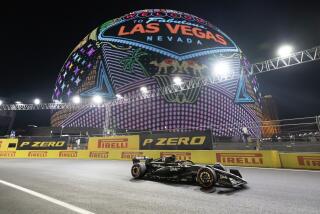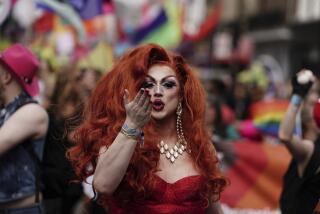Protests and clashes as Bahrain prepares for Grand Prix
Chanting protesters reportedly clashed with police Friday in Bahrain even as race cars began looping the tracks before the Formula One Grand Prix on Sunday. Reuters reported that dozens of young men skirmished with police firing tear gas as an authorized rally broke up west of Manama.
Miles away at the races, which went on unaffected, Formula One chief Bernie Ecclestone brushed off reports of trouble. “You guys are the ones who write about the rubbish,” he told reporters, according to the Associated Press. “Have you found any?”
The Grand Prix has become a battleground for critics and defenders of the Bahraini government. Canceled two years ago after anti-government protests first erupted, the race went on last year over the fervent objections of rights groups in an effort to promote Bahrain as stable and unruffled.
Human rights activists have repeatedly tried to steer the global spotlight away from the famed race onto abuses in Bahrain, which has endured more than two years of unrest after a crackdown on protests. Opposition rallies have demanded greater democracy and a bigger voice for Shiite Muslims in the Sunni Muslim monarchy.
Bahrain promised reform after a sweeping independent report described torture, beatings and other violations committed by the state, but activists say it continues to punish dissidents and brutalize protesters. Street clashes have turned deadly as the unrest continues to simmer: Rioters have lobbed Molotov cocktails in dangerous and sometimes fatal attacks on police, according to the Interior Ministry.
As the race proceeded again this year, organizers insisted the Grand Prix was bringing the country together. Formula One and the world governing body for racing “strongly believe that sport can often be a force for good and that the staging of the Grand Prix in Bahrain will come some way in helping soothe some of the issues which have been raised in the media,” the two said in a statement Friday.
Holding the Grand Prix “is a message to the terrorists that their scare tactics have failed,” a group called Citizens for Bahrain wrote on its website, urging that the race go forward.
However, Human Rights Watch said abuse of protesters was escalating ahead of the competition and warned racing officials that “human suffering and repression is tainting their sport.” Local human rights activists have repeatedly urged Formula One participants to pull out.
By taking part, “you will be once again allowing a repressive regime to hijack your sport for political purposes, whilst it also unleashes further repression to try and silence its critics,” four Bahraini activist organizations wrote to Grand Prix participants. Some protesters brandished signs against the races.
Yet the globally watched event has also helped activists bring more attention to their country: In the days leading up to the race, websites normally focused squarely on sports ran reports mentioning the jailing of dissidents and “a bloody political crisis” in Bahrain.
A British television crew was ejected from the country Friday, accuse of failing to obtain a license and violating other media regulations; the channel said it had obtained the proper visas. Before it was asked to leave, ITV filed a report on the unrest that showed burning roadblocks and thousands of protesters marching in the streets.
Bahraini officials did not respond to a request for comment on the protests that was emailed Thursday. Government spokeswoman Samira Rajab told reporters Monday that reports of increased violence were exaggerated and said the race shouldn’t be linked to “political affairs.”
She waved off the planned protests, telling the Agence France-Presse they were “childish movements implementing Iranian agendas.” Bahraini officials have repeatedly asserted that their foe, Iran, is stirring up unrest to undermine the country; the independent report could not verify any such link.
Reported abuses in Bahrain pose a dilemma for the United States, which counts the Persian Gulf island nation as a key ally in the region against Iran. The Obama administration has criticized human rights violations in the country, angering some Bahraini officials, but activists argue that it is still exerting too little pressure.
ALSO:
Venezuela’s Maduro is sworn in as president
Bombing suspects’ father, Chechen officials cry ‘set up’
Boston blasts unlikely to worsen U.S.-Russia ties, analysts say
More to Read
Sign up for Essential California
The most important California stories and recommendations in your inbox every morning.
You may occasionally receive promotional content from the Los Angeles Times.










